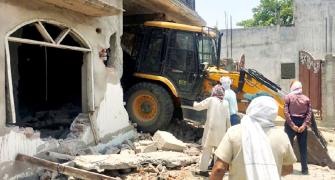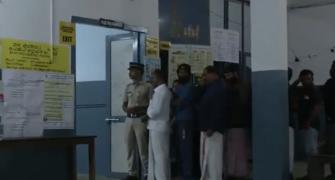The rule of law is an umbrella concept to protect citizens against the power of the State and it is necessary for democracy and good governance, the Supreme Court said on Wednesday.

Laying down pan-India guidelines on demolition of properties, the apex court said the rule of law ensures that actions of the government and its authorities are governed by established legal principles, rather than arbitrary discretion.
"Ensuring the preservation of the principle of rule of law and the protection of the civil rights and liberties of citizens is essential for protecting constitutional democracy," a bench of Justices B R Gavai and K V Viswanathan said in its 95-page verdict.
It said the law must be just and fair and should protect the human rights and dignity of all members of society.
"At the same time, the essential purpose of the rule of law is to prevent the abuse of power. The rule of law is an umbrella concept to protect citizens against the power of the State. It is integral to and necessary for democracy and good governance," the bench said.
The court said it is well settled that the rule of law has been described as a safeguard against the arbitrary use of State power.
"Whenever the citizens, in the form of mobs, have broken the law to vandalise or to declare threats, the court has cast an obligation on the State to prevent such threats or assaults," it said.
The bench said this obligation underscores the State's responsibility to maintain law and order and protect citizens from unlawful actions that undermine the rule of law itself.
"It is not necessary to state that the failure to uphold these obligations can erode public confidence in the justice system, leading to an environment where the rule of law is compromised by lawlessness," it said.
The court said the concept of the rule of law is not abstract but is reflected in the substantive content of various legal domains.
It added that the processes enshrined in constitutional law, criminal law and procedure are facets of the rule of law and, thus, serve to regulate the exercise of executive power.
Referring to the doctrine of separation of powers, the top court said the executive cannot replace the judiciary in performing its core functions.
It said if the executive acts as a judge and inflicts the penalty of demolition on a citizen on the ground that he is an accused, it violates the principle of "separation of powers".
"We are of the view that in such matters, the public officials, who take the law in their hands, should be made accountable for such high-handed actions," the bench said.
It also referred to the aspect of the rights of an accused under the Constitution.
"While we consider the issue in this case, we will have to reiterate that even the incarcerated individuals, whether accused, undertrial or convicts, have certain rights, as any other citizen," it said.
"They have a right to dignity and cannot be subjected to any cruel or inhuman treatment. The punishment awarded to such persons has to be in accordance with law. Such punishment cannot be inhuman or cruel," the bench said.
It added that even an accused or a convict has certain rights and safeguards in the form of constitutional provisions and criminal law.
The bench noted that the State and its officials cannot take arbitrary and excessive measures against an accused or even against convicts, without following the due process as sanctioned by law.
"The third principle that would emerge is that when the right of an accused or a convict is violated on account of illegal or arbitrary exercise of power by the State or its officials or on account of their negligence, inaction or arbitrary action, there has to be an institutional accountability," it said.
The bench said one of the measures for redressing the grievance for violation of a right would be to grant compensation.
"At the same time, if any of the officers of the State has abused his powers or acted in a totally arbitrary or mala fide manner, he cannot be spared for such an illegal, arbitrary, mala fide exercise of power," it said.










